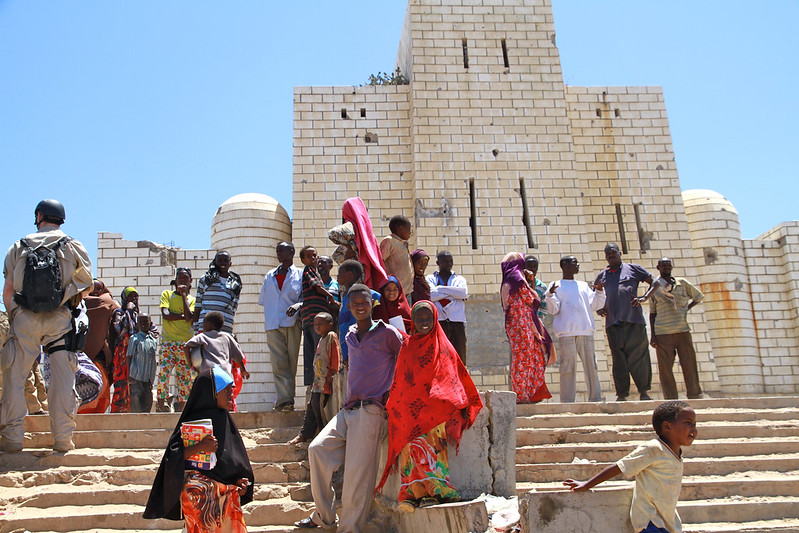Somali Diaspora: Hope For Change
 For decades, poverty and insecurity have drastically risen in Somalia due to prolonged conflict and extreme weather conditions, sparking a catastrophic humanitarian crisis. Since 2006, Al-Shabaab’s continuous mutiny has led to food insecurity, drought and widespread displacement, affecting more than 2.9 million people. Additionally, a significant lack of health care has exacerbated the crisis. According to the European Union (EU), as of 2024, about 6.9 million Somalians need life-saving humanitarian assistance. Recently, a severe drought affected 90% of the country, impacting more than 8 million people. Fortunately, the Somali diaspora, one of the most dispersed migrant groups plays a crucial role in providing support and resources to both their homeland
For decades, poverty and insecurity have drastically risen in Somalia due to prolonged conflict and extreme weather conditions, sparking a catastrophic humanitarian crisis. Since 2006, Al-Shabaab’s continuous mutiny has led to food insecurity, drought and widespread displacement, affecting more than 2.9 million people. Additionally, a significant lack of health care has exacerbated the crisis. According to the European Union (EU), as of 2024, about 6.9 million Somalians need life-saving humanitarian assistance. Recently, a severe drought affected 90% of the country, impacting more than 8 million people. Fortunately, the Somali diaspora, one of the most dispersed migrant groups plays a crucial role in providing support and resources to both their homeland
Pressing Needs
Since the 1990s, health care in Somalia has been profoundly scarce, with more than 11.5 million Somalians lacking health services due to the absence of a functional central government. Additionally, the prolonged conflict has devastated mental health care, leading to widespread trauma, social deprivation and substance abuse.
The emergence of the Somali diaspora in the early 1990s has been fundamental to Somalia’s economy. Somalians living abroad contribute significantly by sending remittances to their families and supporting essential humanitarian needs like education and health care. Some diasporans collaborate directly with organizations that deliver educational and health care services in Somalia.
In addition, education in Somalia is significantly inadequate, with more than three million children unable to attend school due to poverty. With 60% of the population under the age of 25, access to education is critical. In 2019, volunteers and organizations contributing to health care and education sent more than $2 million in remittances to Somalia. However, challenges persist. Health care costs remain high, prompting Somali diaspora organizations to tirelessly support humanitarian needs. Additionally, ongoing conflict and environmental instability continue to disrupt many Somalians’ lives, necessitating emergency support.
Contributing to the Economy
The Somali diaspora is a major contributor to economic development and livelihood in Somalia. Agriculture has been the main funding for Somalia for decades, however, due to flooding, extreme drought and ongoing conflict, this has resulted in nearly five million Somalians experiencing food insecurity. The Somali diaspora works by investing in businesses, creating job opportunities and promoting entrepreneurship. Statistics reveal that around 30%-40% of funding for major local businesses come from the diaspora. In addition, remittances represent around 23% of Somali household income. Remittances are crucial for many Somalians, with 25% of households relying on them as their primary source of income. They use this money to cover living expenses, education and health care.
Diaspora business engagement has been beneficial in multiple aspects. Business investments contribute to a wide range of businesses around Somalia including small-scale businesses such as telecommunication, construction, remittances and trade. Funding Somali businesses has created employment opportunities for many Somalians, improved the livelihoods of families and generated revenue for the government.
Looking Forward
The Somali diaspora’s contributions are essential in bridging gaps in education, health care and economic development in Somalia. The ongoing support and remittances play a pivotal role in stabilizing the country’s socio-economic landscape. By fostering entrepreneurship and investing in vital sectors, the Somali diaspora not only aids immediate needs but also builds a foundation for sustainable growth and recovery.
– Emily Whatley
Emily is based in Truro, UK and focuses on Good News and Global Health for The Borgen Project.
Photo: Flickr
